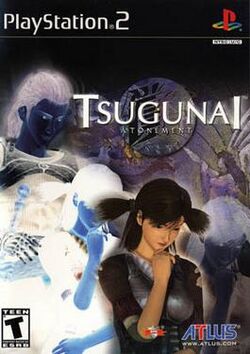Software:Tsugunai: Atonement
| Tsugunai: Atonement | |
|---|---|
 North American cover art | |
| Developer(s) | Cattle Call |
| Publisher(s) | |
| Director(s) | Yoshihiro Yamamoto |
| Designer(s) |
|
| Programmer(s) | Hirotoshi Kuwabara |
| Writer(s) | Katsutoshi Sasaki |
| Composer(s) | Yasunori Mitsuda |
| Platform(s) | PlayStation 2 |
| Release | |
| Genre(s) | Role-playing |
| Mode(s) | Single-player |
Tsugunai: Atonement [lower-alpha 1] is a 2001 role-playing video game developed by Cattle Call for the PlayStation 2. It was published in Japan by Sony Computer Entertainment and in North America by Atlus USA.
Story
The main character, Reise, is a Raven, a sort of mercenary who takes dangerous jobs to earn a living. The game opens as Reise climbs an ancient tower to retrieve the Treasure Orb, a sacred artifact. In doing so, he angers the gods, who retaliate by separating Reise's body and soul. In order to atone for his sins, Reise must demonstrate kindness and courage by assisting the denizens of a small fishing village. He accomplishes this by possessing the bodies of those he needs to help, in order to allow them to accomplish tasks that they will not or cannot accomplish by themselves. In time, he ends up saving the village from a great evil.
Gameplay
The game is broken up into around 35 different quests. Some of them involve the principal characters, while some are more peripheral and lets the player explore the lives of some of the other characters in the village. All combat-oriented quests involve the principal characters. Once Reise meets the quest's objective, the quest is solved and the story advances, often changing the situation in the village and opening up new quests.
Even though the game involves many different characters, the mechanics treat the characters as equal, except in the case of the weapons they can equip. Magic, supplementary equipment, and items are carried over from quest to quest, regardless of whom Reise possesses.
Music
The score was written by Yasunori Mitsuda, better known for his earlier work on games in the Chrono series and Xenogears.[3][4] A soundtrack featuring enhanced quality, An Cinniùint, was released in Japan on December 25, 2001.[5]
Reception
| Reception | ||||||||||||||||||||||||||||
|---|---|---|---|---|---|---|---|---|---|---|---|---|---|---|---|---|---|---|---|---|---|---|---|---|---|---|---|---|
| ||||||||||||||||||||||||||||
In Japan, Famitsu gave the game a score of 28 out of 40.[9] Upon its release in North America, the game received "average" reviews according to the review aggregation website Metacritic.[6]
Tsugunai: Atonement sold poorly,[citation needed] debuting at number 19 on the Famitsu Japanese sales chart and selling 6,261 units.[16]
References
- ↑ IGN staff (November 29, 2001). "Tsuganai Ships Today! Rejoice!". Ziff Davis. https://www.ign.com/articles/2001/11/30/tsuganai-ships-today-rejoice. Retrieved August 13, 2020.
- ↑ Sony staff. "tsugunai 〜つぐない〜" (in Japanese). Sony Computer Entertainment. http://www.jp.playstation.com/software/title/scps11007.html. Retrieved April 4, 2012.
- ↑ Kennedy, Sam (January 28, 2008). "Radical Dreamer: Yasunori Mitsuda". Ziff Davis. Archived from the original on November 3, 2012. https://web.archive.org/web/20121103121915/http://www.1up.com/features/radical-dreamer?pager.offset=0. Retrieved April 6, 2012.
- ↑ Hill, Doug (October 5, 2001). "Atlus Talks Hoshigami, Tsugunai, and Wizardry". http://archive.rpgamer.com/news/Q4-2001/100501a.html. Retrieved August 13, 2020.
- ↑ Kanzaki, Sumire (January 8, 2002). "Tsugunai Soundtrack Sees Release". https://www.rpgfan.com/news/2002/1016.html. Retrieved April 6, 2012.
- ↑ 6.0 6.1 "Tsugunai: Atonement for PlayStation 2 Reviews". CBS Interactive. https://www.metacritic.com/game/tsugunai-atonement/critic-reviews/?platform=playstation-2. Retrieved April 6, 2012.
- ↑ Thompson, Jon. "Tsugunai: Atonement - Review". All Media Network. Archived from the original on November 15, 2014. https://web.archive.org/web/20141115094545/http://www.allgame.com/game.php?id=36606&tab=review. Retrieved August 13, 2020.
- ↑ EGM staff (February 2002). "Tsugunai: Atonement". Electronic Gaming Monthly (Ziff Davis) (151): 158.
- ↑ 9.0 9.1 "tsugunai 〜つぐない〜 [PS2"] (in Japanese). Famitsu (Enterbrain). https://www.famitsu.com/cominy/?m=pc&a=page_h_title&title_id=9436&redirect=no. Retrieved August 13, 2020.
- ↑ Kato, Matthew (January 2002). "Tsugunai: Atonement". Game Informer (FuncoLand) (105): 83. Archived from the original on November 7, 2005. https://web.archive.org/web/20051107011448/http://www.gameinformer.com/Games/Review/200201/R03.0801.1012.02509.htm?CS_pid=280312. Retrieved August 13, 2020.
- ↑ Star Dingo (December 11, 2001). "Tsugunai: Atonement Review for PS2 on GamePro.com". GamePro (IDG Entertainment). Archived from the original on December 22, 2004. https://web.archive.org/web/20041222040021/http://www.gamepro.com/sony/ps2/games/reviews/19062.shtml. Retrieved August 13, 2020.
- ↑ Villoria, Gerald (January 14, 2002). "Tsugunai: Atonement Review [date mislabeled as "May 17, 2006""]. CBS Interactive. https://www.gamespot.com/reviews/tsugunai-atonement-review/1900-2838817/. Retrieved August 13, 2020.
- ↑ Fujita, Mark (December 10, 2001). "Tsugunai: Atonement". Ziff Davis. https://www.ign.com/articles/2001/12/11/tsugunai-atonement. Retrieved August 13, 2020.
- ↑ "Tsugunai: Atonement". Official U.S. PlayStation Magazine (Ziff Davis) (53): 114. February 2002.
- ↑ "Review: Tsugunai: Atonement". PSM (Imagine Media). January 2002.
- ↑ Famitsu staff (March 1, 2001). "ゲームソフト販売ランキング TOP30" (in Japanese). Famitsu (Enterbrain). http://www.famitsu.com/game/rank/2001/03/01/index.html. Retrieved April 6, 2012.
Notes
- ↑ Known in Japan as simply Tsugunai (つぐない)
External links
 |

